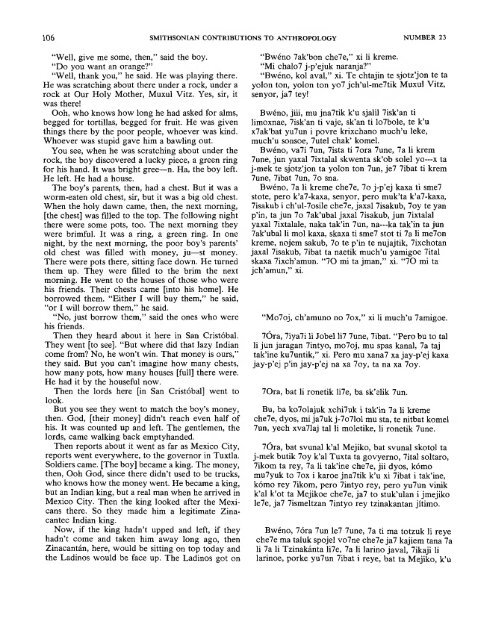PDF (Lo-Res) - Smithsonian Institution Libraries
PDF (Lo-Res) - Smithsonian Institution Libraries
PDF (Lo-Res) - Smithsonian Institution Libraries
You also want an ePaper? Increase the reach of your titles
YUMPU automatically turns print PDFs into web optimized ePapers that Google loves.
106 SMITHSONIAN CONTRIBUTIONS TO ANTHROPOLOGY NUMBER 23<br />
"Well, give me some, then," said the boy.<br />
"Do you want an orange?"<br />
"Well, thank you," he said. He was playing there.<br />
He was scratching about there under a rock, under a<br />
rock at Our Holy Mother, Muxul Vitz. Yes, sir, it<br />
was there!<br />
Ooh, who knows how long he had asked for alms,<br />
begged for tortillas, begged for fruit. He was given<br />
things there by the poor people, whoever was kind.<br />
Whoever was stupid gave him a bawling out.<br />
You see, when he was scratching about under the<br />
rock, the boy discovered a lucky piece, a green ring<br />
for his hand. It was bright gree—n. Ha, the boy left.<br />
He left. He had a house.<br />
The boy's parents, then, had a chest. But it was a<br />
worm-eaten old chest, sir, but it was a big old chest.<br />
When the holy dawn came, then, the next morning,<br />
[the chest] was filled to the top. The following night<br />
there were some pots, too. The next morning they<br />
were brimful. It was a ring, a green ring. In one<br />
night, by the next morning, the poor boy's parents'<br />
old chest was filled with money, ju—st money.<br />
There were pots there, sitting face down. He turned<br />
them up. They were filled to the brim the next<br />
morning. He went to the houses of those who were<br />
his friends. Their chests came [into his home]. He<br />
borrowed them. "Either I will buy them," he said,<br />
"or I will borrow them," he said.<br />
"No, just borrow them," said the ones who were<br />
his friends.<br />
Then they heard about it here in San Cristobal.<br />
They went [to see]. "But where did that lazy Indian<br />
come from? No, he won't win. That money is ours,"<br />
they said. But you can't imagine how many chests,<br />
how many pots, how many houses [full] there were.<br />
He had it by the houseful now.<br />
Then the lords here [in San Cristobal] went to<br />
look.<br />
But you see they went to match the boy's money,<br />
then. God, [their money] didn't reach even half of<br />
his. It was counted up and left. The gentlemen, the<br />
lords, came walking back emptyhanded.<br />
Then reports about it went as far as Mexico City,<br />
reports went everywhere, to the governor in Tuxtla.<br />
Soldiers came. [The boy] became a king. The money,<br />
then, Ooh God, since there didn't used to be trucks,<br />
who knows how the money went. He became a king,<br />
but an Indian king, but a real man when he arrived in<br />
Mexico City. Then the king looked after the Mexicans<br />
there. So they made him a legitimate Zinacantec<br />
Indian king.<br />
Now, if the king hadn't upped and left, if they<br />
hadn't come and taken him away long ago, then<br />
Zinacantan, here, would be sitting on top today and<br />
the Ladinos would be face up. The Ladinos got on<br />
"Bweno 7ak'bon che7e," xi li kreme.<br />
"Mi chalo7 j-p'ejuk naranja?"<br />
"Bweno, kol aval," xi. Te chtajin te sjotz'jon te ta<br />
yolon ton, yolon ton yo7 jch'ul-me7tik Muxul Vitz,<br />
senyor, ja7 tey!<br />
Bweno, jiii, mu jna7tik k'u sjalil 7isk'an ti<br />
limoxnae, 7isk'an ti vaje, sk'an ti Io7bole, te k'u<br />
x7ak'bat yu7un i povre krixchano much'u leke,<br />
much'u sonsoe, 7utel chak' komel.<br />
Bweno, va7i 7un, 7ista ti 7ora 7une, 7a li krem<br />
7une, jun yaxal 7ixtalal skwenta sk'ob solel yo—x ta<br />
j-mek te sjotz'jon ta yolon ton 7un, je7 7ibat ti krem<br />
7une, 7ibat 7un, 7o sna.<br />
Bweno, 7a li kreme che7e, 7o j-p'ej kaxa ti sme7<br />
stote, pero k'a7-kaxa, senyor, pero muk'ta k'a7-kaxa,<br />
7isakub i ch'ul-7osile che7e, jaxal 7isakub, 7oy te yan<br />
p'in, ta jun 7o 7ak'ubal jaxal 7isakub, jun 7ixtalal<br />
yaxal 7ixtalale, naka tak'in 7un, na—ka tak'in ta jun<br />
7ak'ubal li mol kaxa, skaxa ti sme7 stot ti 7a li me7on<br />
kreme, nojem sakub, 7o te p'in te nujajtik, 7ixchotan<br />
jaxal 7isakub, 7ibat ta naetik much'u yamigoe 7ital<br />
skaxa 7ixch'amun. "7O mi ta jman," xi. "7O mi ta<br />
jch'amun," xi.<br />
"Mo7oj, ch'amuno no 7ox," xi li much'u 7amigoe.<br />
7Ora, 7iya7i li Jobel Ii7 7une, 7ibat. "Pero bu to tal<br />
li jun jaragan 7intyo, mo7oj, mu spas kanal, 7a taj<br />
tak'ine ku7untik," xi. Pero mu xana7 xa jay-p'ej kaxa<br />
jay-p'ej p'in jay-p'ej na xa 7oy, ta na xa 7oy.<br />
7Ora, bat li ronetik Ii7e, ba sk'elik 7un.<br />
Bu, ba ko7olajuk xchi7uk i tak'in 7a li kreme<br />
che7e, dyos, mi ja7uk j-7o71ol mu sta, te nitbat komel<br />
7un, yech xva71aj tal li moletike, li ronetik 7une.<br />
7Ora, bat svunal k'al Mejiko, bat svunal skotol ta<br />
j-mek butik 7oy k'al Tuxta ta govyerno, 7ital soltaro,<br />
7ikom ta rey, 7a li tak'ine che7e, jii dyos, komo<br />
mu7yuk to 7ox i karoe jna7tik k'u xi 7ibat i tak'ine,<br />
komo rey 7ikom, pero 7intyo rey, pero yu7un vinik<br />
k'al k'ot ta Mejikoe che7e, ja7 to stuk'ulan i jmejiko<br />
Ie7e, ja7 7ismeltzan 7intyo rey tzinakantan jitimo.<br />
Bweno, 76ra 7un Ie7 7une, 7a ti ma totzuk li reye<br />
che7e ma taluk spojel vo7ne che7e ja7 kajiem tana 7a<br />
li 7a li Tzinakanta Ii7e, 7a li larino javal, 7ikaji li<br />
larinoe, porke yu7un 7ibat i reye, bat ta Mejiko, k'u

















